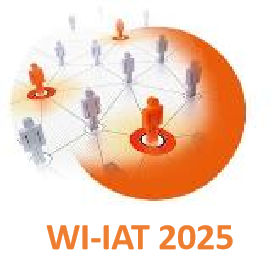

Title: Sensing Bodies, Shaping Care: Affective Computing for Health and Wellbeing
Professor Nadia Bianchi-Berthouze
University College London, UK
Abstract: Affective computing and body-sensing technologies are opening new possibilities to enhance wellbeing and transform healthcare. By analysing and modelling human movement and touch behaviour, we can not only gain insights and modulate affective interaction, but also design technologies that actively support health and wellbeing management. However, to be effective, the design of affective technologies must be grounded in an understanding of how affect is expressed and engaged with in everyday functioning. In this talk, I will share lessons from three case studies. First, I will discuss chronic pain self-directed rehabilitation, showing how sensing body movement can support people with chronic pain in remaining active. Second, I will present work with occupational therapists, where we explored how robotics and interactive technologies can be used for touch assessment training and skill development, supporting therapists in their embodied, hands-on practice. Finally, I will show how body-sensing technologies extend beyond healthcare into everyday wellbeing, using the example of smart technologies to promote more sustainable fashion choices-helping people reflect not only on how clothes fit and look, but also on how they shape self-perception and confidence. Taken together, these studies demonstrate how affective computing can leverage embodied, bottom-up mechanisms to enrich our perception of the body and its capabilities, while opening new pathways for health, wellbeing, and sustainable living.
Short Bio: Nadia Berthouze is a Full Professor in Affective Computing and Interaction at the University College London Interaction Centre (UCLIC). She is currently Deputy Director of UCLIC and she will be the DIrector starting on January 2026. Her research focuses on designing technology that can sense the affective state of its users and use that information to tailor the interaction process. She has pioneered the field of Affective Computing by investigating how body movement and touch behaviour can be used as means to recognize and measure the quality of the user experience. She also studied how full-body technology and body sensory feedback can be used to modulate people's perception of themselves and of their capabilities to improve self-efficacy and coping capabilities. Her work has been motivated by real-world applications such as physical rehabilitation (EPSR Embodied Intelligence, EPSRC Emo&Pain, H2020 EnTiMeMent), technology for textile design (EPSRC Digital Sensoria, EPSRC Textile Circularity Centre), education (H2020 WeDraw) and wellbeing (Intelligent Embodied Interaction, EPSRC; H2020 Human Manufacturing, EPSRC Embodied Intelligence). She has published more than 200 papers in Affective Computing, HCI, and Pattern Recognition.

Title: Psychoanalysis (and Therapy) of LLMs with Special Regard to their Use for an Automated Data Curation
University of Calabria, Italy
Abstract: ChatGPT and other LLMs are the most recent major outcome of the ongoing Ai revolution. The talk begins with a brief discussion of such (text-based) generative AI tools and showcases instances where these models excel, namely when it comes to generating beautifully composed texts. We then discuss shortcomings of LLM with regard to their use for constructing and curating data and knowledge bases or knowledge graphs, where they often produce erroneous information. The latter is often the case when LLMs are prompted for data that are not already present in Wikipedia or other authoritative Web sources, thus, where a judgmental decision is required. To understand why so many errors and "hallucinations" occur, we report about our findings about the "psychopathology of everyday prompting" and identify and illustrate several key reasons for potential failures in language models, which include, but are not limited to: (i) information loss due to data compression, (ii) training bias, (iii) the incorporation of incorrect external data, (iv) the misordering of results, and (v) the failure to detect and resolve logical inconsistencies contained in a sequence of LLM-generated prompt-answers. In the second part of the talk, we give a survey of Chat2Data project, which endeavors to leverage language models for the automated verification and enhancement of relational databases and knowledge graphs, all while mitigating the pitfalls (i)-(v) mentioned earlier.
Short Bio: Georg Gottlob is a Professor of Computer Science at the University of Calabria and a Professor Emeritus at Oxford University and TU Wien. Until recently, he was a Royal Society Research Professor at Oxford,and a Fellow of Oxford's St John's College and an Adjunct Professor at TU Wien. His interests include knowledge representation, database theory, query processing, web data extraction, and (hyper)graph decomposition techniques. Gottlob has received the Wittgenstein Award from the Austrian National Science Fund and the Ada Lovelace Medal in the UK. He is an ACM Fellow, an ECCAI Fellow, a Fellow of the Royal Society, and a member of the Austrian Academy of Sciences, the German National Academy of Sciences, and the Academia Europaea. He chaired the Program Committees of IJCAI 2003 and ACM PODS 2000, is on the Editorial Board of JCSS, and was on the Editorial Board of and was on the Editorial Boards of JACM and CACM. He was a founder of Lixto, a web data extraction firm acquired in 2013 by McKinsey & Company. In 2015 he co-founded Wrapidity, a spin out of Oxford University based on fully automated web data extraction technology developed in the context of an ERC Advanced Grant. Wrapidity was acquired by Meltwater, an internationally operating media intelligence company. Gottlob then co-founded the Oxford spin-out DeepReason.AI, which provided knowledge graph and rule-based reasoning software to customers in various industries. DeepReason.AI was also acquired by Meltwater.

Title: Web of Minds: Evolution of Common Senses in Societies with Diversity
The University of Tokyo, Japan
Abstract: In this talk, the effects of the diversity of individuals and things, connected in society, are discussed. First, the concept of "chance discovery" developed by the speaker 25 years ago is introduced. Applying this concept to the use of data on markets and human mobility, the diversity of ideas and movements of humans, if connected, is shown to cause opportunities in businesses and the risk of pandemics. Furthermore, the evolution of common sense in society is discussed referring to the dynamics of the evolution of senses of words and items simulated by "semantic cells" where the interactions of words, ideas, contexts, and things are computed simply following their sequential co-occurrences. This talk will provide the audience with insights into the potential impact of the human-AI ecosystem, where data and the human mind co-evolve, on the new standards of human life.
Short Bio: After obtaining a doctor of engineering from the Graduate School of Engineering, the University of Tokyo in 1995, he became an assistant professor at the Graduate School of Engineering, Osaka University, an assistant professor at the Graduate School of Business Sciences at Tsukuba University, a specially appointed assistant professor at the Graduate School of Information Science and Engineering, the University of Tokyo, and the system creation of the Graduate School of Engineering. After working as an associate professor in the Department of Science, he has been a professor since July 2009.He founded opportunity discovery science and data market design science at the boundary between intelligent informatics and design science, cognitive science, and held international conferences and industry-academia WS. From 7 onwards, he will lead workshops such as Market of Data to success at the IEEE Data Mining International Conference (ICDM) from the perspective of the data market.

Title: Rethinking Multi-agent Systems in the Era of LLMs
University of Oxford, UK
Abstract: The original metaphor for the field of multi-agent systems was that of a team of experts, each with distinct expertise, cooperating to solve a problem that was beyond the capabilities of any individual expert. "Cooperative distributed problem solving", as it was originally called, eventually broadened to consider all issues that arise when multiple AI systems interact. The emergence and dramatic success of Large Language Models (LLMs) has given new life to the old dream, and "agentic AI" is currently one of the most hyped areas in the most hyped technology of the century to date. A raft of LLM-powered agent frameworks have become available, and standards for LLM-agents such as MCP and A2A are rapidly gaining traction. A range of promising applications of multi-agent LLMs have been reported, such as DeepMind's co-Scientist, where a complex problem solving system is structured in exactly the way that was envisaged decades ago. So, what lessons can we take from the three decades of research into multi-agent systems in the new era of LLM agents? In this talk, we'll survey the main approaches, opportunities, and challenges for multi-agent systems in new world of LLM-based AI.
Short Bio: Michael Wooldridge is the Ashall Professor of the Foundations of Artificial Intelligence at the University of Oxford. He has been an AI researcher for more than 30 years, and has published more than 450 scientific articles on the subject, including nine books, translated into eight languages. He is a Fellow of the Association for Computing Machinery (ACM), the Association for the Advancement of AI (AAAI), and the European Association for AI (EurAI), and is a member of Academia Europaea. His is President Elect of the Association for Advancement of AI (AAAI); from 2014-16, he was President of the European Association for AI, and from 2015-17 he was President of the International Joint Conference on AI (IJCAI); he is currently co-editor in chief of "Artificial Intelligence" journal. He has received the Lovelace medal from the British Computer Society (2020), the Patrick Henry Winston Outstanding Educator Award from the Association for Advancement of AI (2021), and the Distinguished Service Award from the European Association for AI (2023). In 2023 he was appointed specialist advisor to the House of Lords inquiry on Large Language Models. He has published two popular science introductions to AI: the Ladybird Expert Guide to AI (2018), and The Road to Conscious Machines (2020). He presented the 2023 Royal Institution Christmas Lectures, broadcast by BBC TV over December 2023, in the 198 th year of the series.
| Edward Feigenbaum (Turing Award Laureate) | WI-IAT 2001, WI-IAT 2012 |
| Lotfi A. Zadeh | WI-IAT 2003 |
| John McCarthy (Turing Award Laureate) | WI-IAT 2004 |
| Tom M. Mitchell | WI-IAT 2004, WI-IAT 2021 |
| Richard M. Karp (Turing Award Laureate) | WI-IAT 2007 |
| Yuichiro Anzai | WI-IAT 2011 |
| John Hopcroft (Turing Award Laureate) | WI-IAT 2013 |
| Andrew Chi-Chih Yao (Turing Award Laureate) | WI-IAT 2014 |
| Joseph Sifakis (Turing Award Laureate) | WI-IAT 2015, WI-IAT 2021 |
| Butler Lampson (Turing Award Laureate) | WI 2016 |
| Leslie Valiant (Turing Award Laureate) | WI 2016, WI-IAT 2021 |
| Raj Reddy (Turing Award Laureate) | WI 2017 |
| Frank van Harmelon | WI-IAT 2021 |